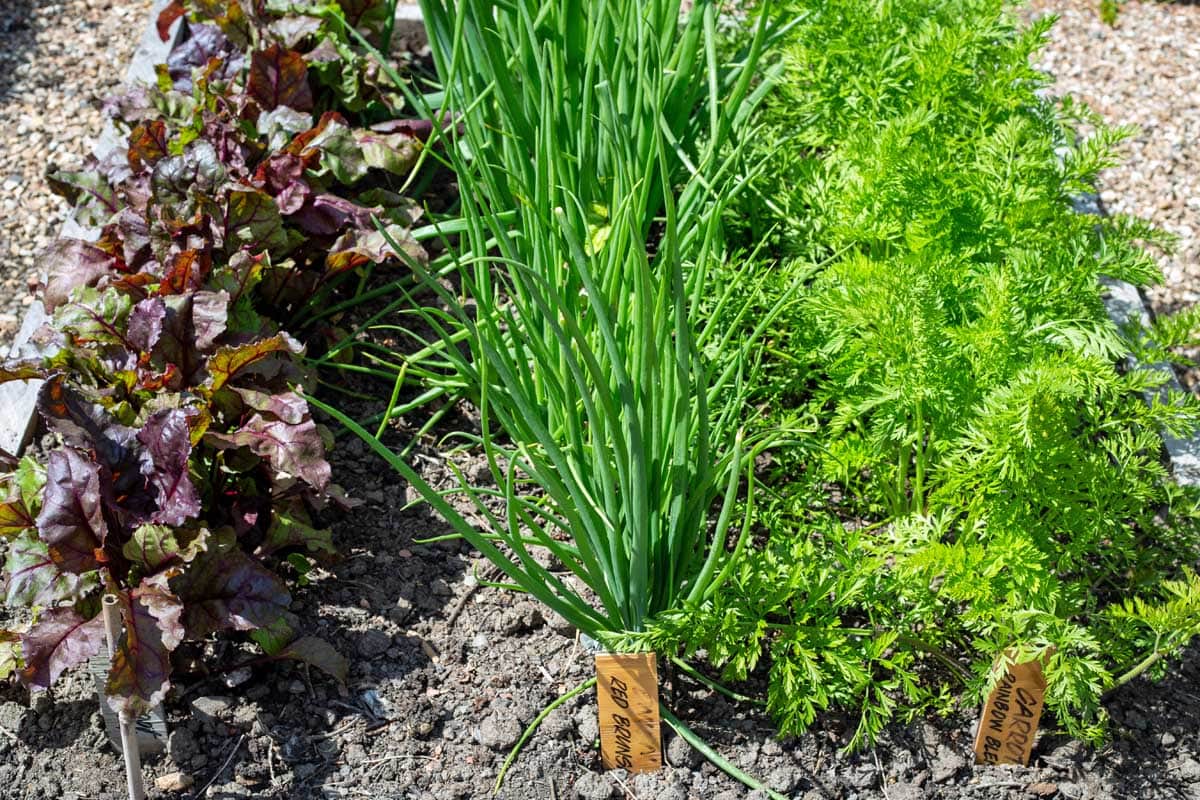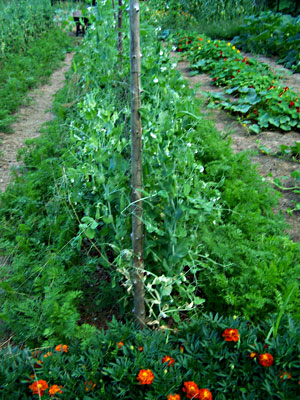The Carrot's Best Friends: Companion Plants That Will Boost Your Harvest
The Carrot's Best Friends: Companion Plants That Will Boost Your Harvest
Carrots are a delicious and nutritious vegetable that is easy to grow in most gardens. But did you know that there are certain plants that can help to boost your carrot harvest? These are known as companion plants, and they can provide a number of benefits to carrots, including:
- Attracting beneficial insects. Some companion plants, such as marigolds and nasturtiums, attract beneficial insects such as ladybugs and hoverflies. These insects help to control pests that can damage carrots, such as carrot flies and aphids.
- Distracting pests. Other companion plants, such as onions and garlic, have strong scents that can distract pests from carrots. This can help to keep your carrots healthy and pest-free.
- Improving soil quality. Some companion plants, such as legumes, can help to improve soil quality. This can benefit carrots by providing them with the nutrients they need to grow strong and healthy.
So, what are some of the best companion plants for carrots? Here are a few of the most popular:
- Onions and garlic. These members of the allium family have strong scents that can help to repel pests from carrots. They can also help to improve soil quality.
- Marigolds. Marigolds are another great companion plant for carrots. They attract beneficial insects and help to distract pests.
- Nasturtiums. Nasturtiums are also attractive to beneficial insects, and they can help to improve soil quality.
- Lettuce. Lettuce is a good companion plant for carrots because it doesn't compete for space or nutrients. It can also help to shade the carrots, which can help to prevent them from bolting.
- Beans. Beans are legumes, which means they can fix nitrogen in the soil. This can benefit carrots by providing them with the nutrients they need to grow strong and healthy.
When planting companion plants with carrots, it's important to consider the spacing requirements of each plant. For example, onions and garlic need more space than marigolds or nasturtiums. It's also important to plant companion plants that will bloom at the same time as your carrots. This will help to ensure that they attract beneficial insects throughout the growing season.
Companion planting is a great way to boost your carrot harvest and keep your plants healthy. By planting the right companion plants, you can help to deter pests, improve soil quality, and attract beneficial insects.
Carrots are a delicious and nutritious vegetable that can be grown in many different climates. But did you know that there are certain companion plants that can help your carrots grow better?
Some of the best companion plants for carrots include:
- Onions and leeks: These plants have a strong smell that can help deter pests, such as carrot flies.
- Marigolds: Marigolds are also known for their pest-repelling properties. They also add a touch of color to your garden.
- Lettuce: Lettuce is a shallow-rooted plant that can help to keep the soil cool and moist, which is ideal for carrots.
- Beans and peas: These legumes can help to improve the soil's nitrogen content, which is beneficial for carrots.
For more information about companion plants for carrots, please visit Gardenia Inspiration. This website has a comprehensive list of companion plants, as well as tips on how to plant and care for them.
FAQ of companion plants to carrots
Question 1: What are companion plants to carrots?
Answer: Carrots grow well with a variety of companion plants, including:
- Allium family: Onions, leeks, chives, and garlic all help to repel carrot pests, such as carrot flies and root maggots.
- Legumes: Beans, peas, and lentils help to improve the nitrogen content of the soil, which benefits carrots.
- Leafy greens: Lettuce, spinach, and kale help to shade the soil around carrots, which helps to keep the roots cool and moist.
- Marigolds: Marigolds help to repel carrot pests and attract beneficial insects, such as ladybugs.
- Nasturtiums: Nasturtiums also help to repel pests and attract beneficial insects.
Question 2: What are some plants that I should avoid planting near carrots?
Answer: There are a few plants that you should avoid planting near carrots, including:
- Celery: Celery is a member of the same family as carrots, and it can compete with carrots for resources.
- Fennel: Fennel has a strong scent that can inhibit the growth of carrots.
- Dill: Dill can also inhibit the growth of carrots.
- Parsnips: Parsnips have a taproot that can compete with the taproot of carrots.
Question 3: How do companion plants benefit carrots?
Answer: Companion plants can benefit carrots in a number of ways, including:
- Reducing pests: Some companion plants, such as marigolds and nasturtiums, help to repel pests that can damage carrots.
- Improving soil quality: Some companion plants, such as legumes, help to improve the nitrogen content of the soil, which benefits carrots.
- Shading the soil: Some companion plants, such as leafy greens, help to shade the soil around carrots, which helps to keep the roots cool and moist.
- Attracting beneficial insects: Some companion plants, such as marigolds and nasturtiums, attract beneficial insects, such as ladybugs, which help to control pests.
Question 4: How do I plant companion plants with carrots?
Answer: When planting companion plants with carrots, it is important to consider the spacing requirements of both plants. For example, marigolds need more space than carrots, so you will need to plant them further apart. You should also consider the growth habits of both plants. For example, if you are planting a tall companion plant, such as a sunflower, you will need to plant it behind the carrots so that it does not shade them.
Question 5: What are some other benefits of companion planting?
Answer: Companion planting can offer a number of other benefits, including:
- Reduced use of pesticides: Companion planting can help to reduce the need for pesticides, as the companion plants can help to control pests naturally.
- Improved crop yields: Companion planting can help to improve crop yields, as the companion plants can provide nutrients and shade to the main crop.
- Increased biodiversity: Companion planting can help to increase biodiversity in the garden, as it provides a variety of habitats for different plants and animals.
Image of companion plants to carrots
- Carrots and beans: Beans fix nitrogen in the soil, which is beneficial for carrots. They also help to shade the soil, which can help to prevent carrot root fly damage.

- Carrots and lettuce: Lettuce helps to suppress weeds, which can help to keep carrots free of competition. It also helps to attract beneficial insects, which can help to control pests.

- Carrots and onions: Onions help to repel carrot root fly, which is a major pest of carrots. They also help to improve the flavor of carrots.

- Carrots and peas: Peas help to improve the drainage in the soil, which can help to prevent carrots from developing forked roots. They also help to attract beneficial insects, which can help to control pests.

- Carrots and tomatoes: Tomatoes help to deter pests, such as carrot root fly and cabbage loopers. They also help to improve the flavor of carrots.
Post a Comment for "The Carrot's Best Friends: Companion Plants That Will Boost Your Harvest"